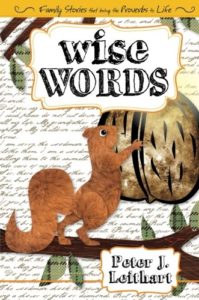

Earlier this week, we posted a list of discussion questions for this theme that work with any book you might be reading with your kids. Today, we’re going to discuss our anchor titles in light of those same thematic issues. Ask your kids what they think!


I’m curious how the rest of you see this theme playing out in Wise Words (for ages 0-10) or in The Playmaker and The True Prince (ages 12 and up). Is the source of wisdom clearly portrayed in the books? How do the main characters show that they are listening to the voice of wisdom and seeking its source?


Janie: I won’t say it’s clear in the two Shakespeare novels, but I hope it’s implied! In The Playmaker, Richard is a country boy who comes to the big city to make his fortune, and stumbles into the theater. Though his religious convictions aren’t fully formed, because of his Puritan mother he has stored quite a bit of scripture in his head—almost the entire book of Psalms. That will help him get a job, but it will also help stabilize him in a profession that requires him to play countless parts. In The True Prince, Kit Glover, another boy actor, has hit rough waters while in transition from boy to man. His story clearly indicates the consequences of heeding the voice of foolishness rather than wisdom, but begins to find his way at the end.
Betsy: Are there other stories from literature that show this same thematic idea of listening to and respecting the source of wisdom? Or, sometimes, like in Pinocchio, we see an example of someone not listening to and respecting the source of wisdom until he has learned the hard way that wisdom is worth respecting!
Alysha: One book that jumps out at me is Pride and Prejudice. Author Jane Austen shows the perils of not seeking wisdom. Elizabeth Bennett was blinded by her opinions of Mr. Darcy and believed the words of a rascal instead of seeking wise counsel. She’s confronted by her decision through the course of the book and makes amends. Her ending is one of joy after she realizes her mistake. In Shakespeare, King Lear is a prime example. The King is willing to listen to false flattery from two of his daughters, but he ignores the silent wisdom of his youngest, and favorite daughter, Cordelia. Lear does not understand his error until it is too late. The tale ends in tragedy but reminds readers to listen to wisdom and turn from folly. One of my favorite Biblical stories, that of Queen Esther, is a prime example of how God leads in wisdom. Esther listened to her uncle Mordecai and spoke out on behalf of her people, the Jews. She risked her life in order to follow wise counsel and God blessed her for that.
Betsy: Great examples, Alysha! I hadn’t thought of Esther, but she’s a perfect example here. What about the rest of you?
Megan: Little Red Riding Hood. As soon as her mother warns her not to stray from the path on her way to Grandmother’s house, we know there’s going to be a story. Because we know our own hearts, that being told not to do something unfortunately inclines us to do it (as Paul explained in Romans 7), and that WE wouldn’t be able to walk on past the temptation, and that if Red Riding Hood did what she was told there wouldn’t be a story, so we would find something else to read.
Janie: It’s not exactly literature, but doesn’t Superman learn wisdom from his father Jor-El as well as his adopted father Jonathan Kent? (You might have to go back to the original sources to discover it!) Spiderman, too, learns from his Uncle Ben that “with great power comes great responsibility.” Macbeth is an example of someone who gives too much heed to a demonic prophesy when he has better counsel at hand.
Betsy: Wow–if we can come up with examples this easily from popular culture, the Bible, Shakespeare, folk literature, the classics… then clearly, this theme is pervasive in literature. Let us know what you discover in the books you’re reading this week!
In case you missed it, Wisdom & Wonder Week 1 covered the real wise man. Stay tuned for more Wisdom & Wonder next week!
Stay Up to Date!
Get the information you need to make wise choices about books for your children and teens.
Our weekly newsletter includes our latest reviews, related links from around the web, a featured book list, book trivia, and more. We never sell your information. You may unsubscribe at any time.
Support our writers and help keep Redeemed Reader ad-free by joining the Redeemed Reader Fellowship.
Stay Up to Date!
Get the information you need to make wise choices about books for your children and teens.
Our weekly newsletter includes our latest reviews, related links from around the web, a featured book list, book trivia, and more. We never sell your information. You may unsubscribe at any time.
FREE Bible Guide!
Get a guide to the Best Bibles for Children and Teens. Perfect for an Easter gift.
We'd love to hear from you!
Our comments are now limited to our members (both Silver and Golden Key). Members, you just need to log in with your normal log-in credentials!
Not a member yet? You can join the Silver Key ($2.99/month) for a free 2-week trial. Cancel at any time. Find out more about membership here.

